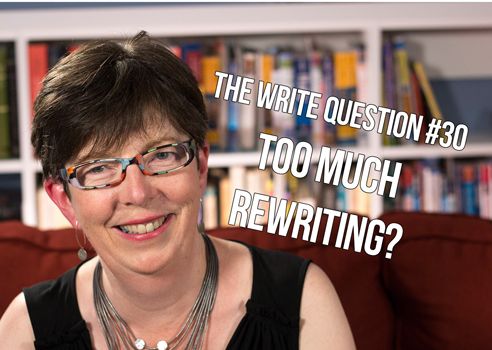Viewing time: 3 mins. 55 secs.
The Write Question is a weekly video podcast about writing that I started in 2017 and that ran, more or less weekly, until April 2022. This is a republication of issue #30, describing how to spend less time rewriting. The post first ran on Sept. 1/17.
Transcript:
Welcome to The Write Question, I’m Daphne Gray-Grant. Today we’re talking about the difference between editing and rewriting — and the benefits of thinking in advance.
Today I’m answering a question from Johanna Lönngren, a PhD candidate at Chalmers University of Technology in Gothenburg, Sweden. Here’s what she wrote.
“I am wondering how exactly you define “editing”? For me — I write mostly academic texts — “editing” a crappy first draft always means that I am completely rewriting the text. I don’t bother using track changes because there will not be any words that have not been changed. How do you manage to separate editing and writing? Or do you consider rewriting as editing?”
Thanks for your question, Johanna. The mix-up between writing and editing, and rewriting and editing plagues many academics and I have a suggestion for you that I think will make your academic life both easier and more productive.
Here’s the big idea: Don’t try to do all of your thinking on paper. There is lots of evidence that our brains work better when we’re moving or doing something else. So, instead of sitting at your computer, go for a walk. Or a run, or a swim. Getting the big muscles of your body moving will help your brain work better. This is partly because our brains use a LOT of oxygen. Even though the brain is a relatively small part of our body it needs 20% of the oxygen we require. Below, I’m attaching a link to a recent blog post I’ve written about that topic.
Now, I know it is probably not a good idea – or even possible – to take notes while swimming. But, the amazing thing about big ideas is that you won’t forget them. Of course, for those people who still want to be able to take notes, stick to walking and take your cell phone with you.
I’ve worked with many academics in the last five years and they’ve all told me that adding walking — or some other form of exercise — to their daily working life has made a huge difference to them.
But if you have any doubt about whether this is a good idea, let me spell out the other downsides of “thinking on paper.”
First, every word you write takes a certain effort. If you haven’t done the thinking beforehand, you’re going to be writing down all sorts of words you aren’t going to be able to use.
Second, every word you write also needs to be edited. Editing is hard work. And time consuming. Every minute you spend editing words that will eventually be removed is time wasted!
It makes way more sense, and it’s a lot more productive to do your work in a more logical order. First, think and research and read. Then, mindmap. Then, write. And finally, revise. Of course, when you’re revising you might get new ideas — and that’s not a problem.
But if you’re always planning on substantial rewriting — so substantial that no words will remain unchanged — that suggests to me that you’re not allowing enough time for thinking in the first place.
As for what to call your rewriting — is it editing or is it writing? — I don’t think it really matters. It’s still work. And you want to get the most value possible for every minute you put in.
Finally, while we’re on the subject of where you do your thinking, let me wrap up with a quote from Lin-Manuel Miranda, creator of the groundbreaking musical Hamilton: “The good idea comes in the moment of rest. It comes in the shower. It comes when you’re doodling or playing trains with your son.”
Thanks for your question, Johanna. I wish you luck in finding new places to do your thinking so you develop really good ideas that need less rewriting.


